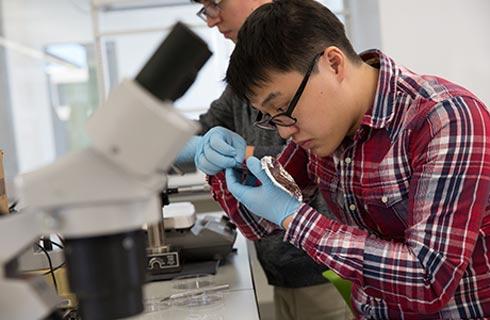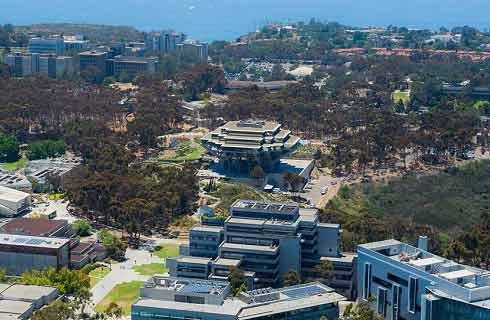理学学士(荣誉)酿造和蒸馏
BSc (Hons) Brewing and Distilling

学历文凭
Bachelor Degree with Honours

专业院系
Combined Studies

开学时间

课程时长

课程学费

国际学生入学条件
IDP—雅思考试联合主办方

雅思考试总分
- 雅思总分:
- 托福网考总分:
- 托福笔试总分:
- 其他语言考试:
CRICOS代码: C980
申请截止日期: 请与IDP联系 以获取详细信息。
课程简介
BSc Brewing and Distilling provides you with the unique opportunity to gain a grounding in engineering and science and explore the mechanisms behind brewing and distilling at an undergraduate level. This is the only undergraduate programme of its kind in the UK, in which you can tailor and develop your STEM knowledge, skills, and background to the drinks and beverage industry. During your undergraduate studies, you’ll learn from a broad curriculum from a wide range of disciplines, including brewing and distilling, biology, process engineering, mathematics, beverage microbiology and biochemistry, food microbiology, bioprocessing, quantitative and qualitative analytical skills, with optional modules in business, accounting and finance, operations management, enterprise, and sustainable development. To develop your brewing and distilling subject knowledge, you’ll explore fundamental topics including, but not limited to, cereal science and technology, yeast science, microbiology, biochemistry, process technology, business studies, management, food safety, quality control and quality assurance, flavour assessment and analytical chemistry. You will develop a sound basis in fundamental scientific and technological principles and learn to apply this in the context of malting, brewing, and distilling. You’ll explore the underlying principles, relevant defining concepts, theories and methods, the current state of knowledge and future development possibilities of the industries, whilst grasping the global, regional, and local contexts of malting, brewing and distilling. You’ll develop knowledge of policy, legislation, ethical, health and safety issues relating to the design, manufacture, marketing and sale of alcoholic drinks which will provide you with a plethora of knowledge and skills which you can directly apply to various roles in industry upon graduation. The drink and beverage industry is continuously growing, and is becoming an increasingly important part of GDP. In Scotland alone, more than 11,000 people are directly employed in the Scotch Whisky industry, with a further 42,000 people indirectly employed by the industry. The growing demand for graduates with an understanding of brewing and distilling, will make you highly employable upon completion of the course. You’ll gain hands-on experience by utilising our on-site brewery, distillery, and rectification laboratory to support your in-depth scientific learning. This will ensure you build the skills and expertise to perform successfully in industry and make you highly employable in all sizes of brewing, distilling and allied industries. Beyond their academic careers, your teaching staff hold various positions of responsibility and authority throughout the industry, including roles on global and local drink companies’ boards and management teams, and on governmental bodies. As a result, your learning will be informed directly by the conversations staff are having both within the university, and outwith in the national and international beverage markets they represent. The teaching staff external roles will further help to improve the industry relevance of the programme, as they will adapt the course content accordingly based on current and predicted industry changes.
相关申请
 预科
预科 奖学金
奖学金 实习机会
实习机会 在校学习
在校学习 跨境学习
跨境学习 校园授课-线上开始
校园授课-线上开始 在线/远程学习
在线/远程学习
开学时间&学费
学费信息仅供参考,请与IDP联系以获取详细信息
| 开学时间 | 时长 | 学费 | 地点 |
|---|
学校排名

世界排名301
数据源:
泰晤士高等教育世界大学排名
关于赫瑞瓦特大学

自1821年以来,赫瑞瓦特大学一直在塑造未来。该校与全球行业建立了密切联系,开设有以就业为中心、在现实世界能够发挥作用的学位课程。赫瑞瓦特大学开设有广泛的本科和研究生课程,专注于STEM(科学、技术、工程和数学)、商业以及设计学科。它提供了一个充满活力的全球学生体验,在英国、迪拜和马来西亚的校园里有30000多名学生。在2024年毕业生成果调查中,赫瑞瓦特在苏格兰毕业生就业能力排名第一,在英国排名第二。2025年,该大学排名第一在苏格兰,毕业生担任首席执行官和董事总经理的比例最高(Novuna业务现金流)。这要归功于屡获殊荣的职业团队提供的以职业为重点的学位和终身支持。赫瑞瓦特大学的学生可以获得开创性的研究和教学,该大学近90%的研究成果在最近的《卓越研究框架》(REF 2021)排名世界领先,在国际上处于优秀地位。爱丁堡、奥克尼和苏格兰边境的苏格兰校区拥有鼓舞人心的绿色环境、一流的设施和行业支持的学习环境。赫瑞瓦特大学是第一所在迪拜开设的英国大学,在那里它获得了知识与人类发展局(KHDA)颁发的著名五星级排名。位于布城的马来西亚校区坐落在一个令人惊叹的湖畔上,提供卓越的教育设施、现代化的休闲和体育设施。凭借具有竞争力的学费和国际关系,赫瑞瓦特将卓越的教育与独特的学习体验相结合。
本校相关课程
其他相关课程

商科学士(国际餐厅管理)(阿德莱德)
 澳大利亚蓝带国际学院
澳大利亚蓝带国际学院学历文凭
Bachelor Degree
开学日期
课程费用总额


Certificate II in Hospitality
 霍姆斯格兰职业技术学院
霍姆斯格兰职业技术学院学历文凭
Certificate II
开学日期
课程费用总额


食品科学与技术研究生证书
 昆士兰大学
昆士兰大学泰晤士高等教育世界大学排名:80
学历文凭
Graduate Certificate
开学日期
课程费用总额


酒店三级证书(餐厅前门)
 查尔斯·达尔文大学
查尔斯·达尔文大学泰晤士高等教育世界大学排名:417
学历文凭
Certificate III
开学日期
课程费用总额


待业证书4(0.5年)
 新南威尔士州立职业技术学院
新南威尔士州立职业技术学院学历文凭
Certificate IV
开学日期
课程费用总额


理学硕士(食品科学与技术)
 科廷大学
科廷大学泰晤士高等教育世界大学排名:256
学历文凭
Masters Degree (Coursework)
开学日期
课程费用总额










 英国
英国





